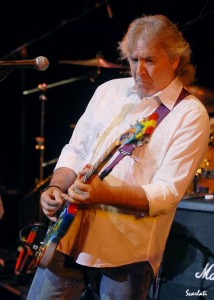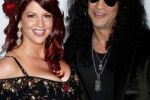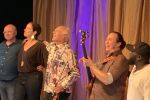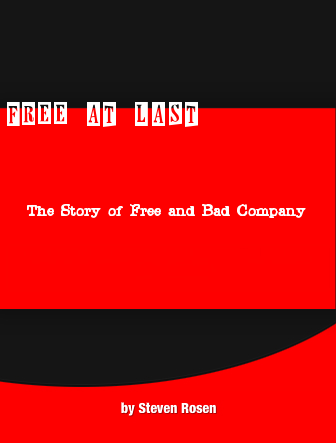Godfrey Townsend Interview: Live at Wolf Trap
Here’s a classic Guitar International magazine interview from November 22, 2009.
by: Rick Landers
The first time I heard Godfrey Townsend was while I was talking to Joey Molland of Badfinger backstage at the Wolf Trap Foundation for the Performing Arts, Vienna, Virgina. Some amazing rock guitar riffs were being yanked about on stage and as I listened I asked Joey “Who the hell is that?” Joey said, “Oh that’s Godfrey Townsend. He’s an amazing guitarist, even Leslie West talks about how great he is.” Later, Joey introduced me to Leslie, who confirmed the guy had licks. With that, I made a point of meeting him and later wrote up a review of his new release, Easy Journey to Other Planets.”
In a music era where the airwaves are destitute of rock guitar, Godfrey Townsend unleashes an album of virtuoso steel-string wonder, reminding us that our electric guitar fanaticism still has sturdy legs. Easy Journey to Other Planets saddles up and takes us for a guitar romp, unlike any that we’ve heard for some time.
The New York City based guitarist has worked with some of the premiere rock musicians of our day including: Leslie West (Mountain); Mitch Ryder (Detroit Wheels); Jack Bruce (Cream); John Entwhistle (The Who); Eddie Vedder (Pearl Jam); Chuck Negron (Three Dog Night); Steve Lukather (Toto); Ace Frehley (KISS); Noel Redding; Buddy Miles; Mick Jones (Foreigner); Spencer Davis and Andy Timmons. Godfrey’s spent journeyman years learning his craft, developing his style and building a solid professional career.
Sometime during the early ’90s, Townsend met John Entwhistle of the legendary rock group, The Who. John recognized talent when he saw it and soon Godfrey became the guitarist for the John Entwhistle Band, touring internationally and playing on several of John’s albums.
As the musical director for the 21st Century Artist’s Beatles tribute, A Walk Down Abbey Road, Godfrey worked worked with fellow musicians Nancy Wilson (Heart); Mark Farner (Grand Funk Railroad); Alan Parsons; Todd Rundgren, Denny Laine (Wings), Joey Molland (Badfinger), Eric Carmen (The Raspberries) and other luminaries in the world of rock.
Godfrey Townsend would later “wow” crowds at B.B. King’s Blues Club in New York City with his tribute to Clapton called, Clapton is GOD-frey. And if you think this guy’s just posing, you’d better read this interview where Clapton’s own guitar tech, Lee Dickson, voiced his admiration for Godfrey’s ability to channel Clapton.
In 2009, Godfrey and his group that include Manny Focarazzo (keyboards), John Montagna (bass) and Steve Murphy (percussion) went back again to B.B. King’s for another annual tribute to Clapton, as show I’ve been told “shouldn’t be missed.”
Guitar International sat down with Godfrey before his gig at Wolf Trap where we started this interview, but before we could finish it he had to head out on stage to rip through some turgid riffs. We recently reconnected and finished up and we’re honored to be able to offer our readers the ruminations and insights on music by one of the best guitarists we’ve heard in a very long time.
******
Rick Landers: Let’s start with a couple of Beatles’ points since you just got this Beatles tribute. And then we’ll move on to Godfrey.
Godfrey Townsend: I like the Beatles.
Rick: Everyone likes the Beatles.
Godfrey: Some people don’t. I don’t trust them. [Rick laughing] Somebody says “I don’t like the Beatles.”
Rick: How can you not like the Beatles? Knowing that the Beatles inspired you early on, what’s it like now knowing you’re the musical driver for the tribute to them, A Walk Down Abbey Road?
Godfrey: I got brought onto that tour from John Entwistle. John was asked to do the tour and I used to sing his tunes in his band. I was in his band for six years so I sang all the stuff that Daltrey sang. He knew he couldn’t pull it off [both laughing], so he invited me, he worked it out so I could come on the tour and work for that summer with him.
Alan Parsons was actually musical director. We had two days rehearsal at this place in Portland, Oregon. Todd Rundgren was there, Ann Wilson, David [Pack] from Ambrosia and it was like a lot of noise going on. Alan would be sitting in the middle of it on a stool going, “Uh, gentlemen? Um, uh…” [Both laughing] like really proper and nobody was listening. Nobody was hearing, so at one point, I grabbed a hold of the situation like, “We’ve got two days to learn all these tunes,” and somebody would say, “I don’t know this part. What’s this thing here?” and I kind of knew what it was on keyboards, or “What’s this harmony?” or “The bass line doesn’t do that. It does this.” “There’s another guitar playing this rhythm thing,” because they saw that I knew a lot about the musical part of it. They made me the musical director.
The second year that it went out, I was brought back on the tour. John wasn’t doing the tour because he was gonna go out with The Who, so they brought in Jack Bruce, the drummer from the Entwistle band was not involved, so I said I would bring my drummer who was Steve Murphy and we ended up being the band with Jack Bruce on bass, me on guitar, Steve on drums, Alan Parsons – keyboard player, John Beck was on keyboards. That year it was Mark Farner, Christopher Cross, Jack Bruce, Alan Parsons and Todd Rundgren.
Rick: What a lineup, eh?
Godfrey: Yeah. Eric Carmen was supposed to be on, too, but he only made it through the first two shows and then split. At the end of that tour Alan asked us to put a band together for him, Steve and I. Jack Bruce also asked me to play with him at the end of that tour. I did some shows with Jack Bruce. We were just supposed to do a tour with him a couple of months ago but it got canceled because he went into the hospital.
So we got a lot of work out of it. We became the Alan Parsons Live project. But, being the guy, yeah, I grew up listening to this music, Beatles music, and over the years just dissected it.
Rick: Just note by note?
Godfrey: Yeah, so it’s kind of good to be in that position where you get to put that to use. Otherwise it’s just…there are a lot of people that go to Beatles conventions and stuff , who know every single note. “He used a 13” tom for that and it was miked three feet away”. They know all this useless information. But, it’s kind of good to be able to have that knowledge and put it to use.
Rick: Tell me about the Clapton thing you’ve been working with.
Godfrey: The Clapton thing is something I’d been wanting to do for years. I wanted to do it back in the ’90s. There’s a guy who actually taught me how to play guitar, I have to say. He was my guitar teacher. That’s how I learned how to play lead guitar, listening to old Cream, live Cream, developing my style.
I can kind of mimic his style pretty well. My singing voice is similar to his in a way that it’s a little bluesy and raspy. His phrasings are just embedded in my brain, guitar and singing. I would cover a couple of tunes in cover bands and people would say, “Wow! You should do a Clapton thing. You sound just like him.” It took me a couple of years and I went, “You know what? I love the music and all of it,” and I just thought it would be good to put something together like a full band. Keyboards, bass, drums, backup singers, another guitar player would be great and that’s how we started it with a couple of girl singers.
Now it’s kind of condensed down to four of us. Greg Smith is not our real bass player but we’ve played with him a lot. Our real bass player is a guy named John Montagna who’s in the Alan Parsons Project. He has also done Walk Down Abbey Road shows with us. We’ve also played with Denny Lane and Joey Molland with him.
Godfrey Townsend – “Layla”

Rick: So, personality mixes as well.
Godfrey: He’s done some Hippie Fests. He just had a baby so he didn’t want to go far from home this summer, so we got Greg Smith. The four of us, everybody sings. I was able to condense the band because of that. I don’t need the girl singers in the background because everybody sings. You can pretty much cover all the vocals of anything we do. We started out doing a lot of stuff from the Journeyman album because it was still pretty new, then it started sounding real dated.
We covered everything from Cream up to the present, but now we’re kind of having fun getting into the Derek and the Dominos era, Blind Faith era.
Rick: Great album, yeah.
Godfrey: We do a killer version of “Had to Cry Today”. Steve Murphy, the drummer, just has this incredibly high voice.
Rick: So, he sounds like Stevie Winwood?
Godfrey: Great stuff. It just sounds good. I’ll see if I can get you a copy of some of the live stuff. I actually have DVDs with me of a couple of the shows, because I was going to try to put a promo together while I’m on the road.
Rick: I understand there’s a story, it’s on your website so let’s review if you don’t mind, with John Entwistle talking to Lee Dixon [Eric Clapton’s guitar technician].
Godfrey: Yeah.
Rick: I interviewed Lee Dixon. That was one of my first interviews.
Godfrey: Did you really? What had happened was one year that John went out with The Who, he was using Lee Dixon as his tech. That was his bass tech. We had already toured, John and I. What we used to do was whenever he was in town with The Who, like when he came in and played the Garden for a few nights, he’d be staying over, we would put together some kind of a jam event at a local club in New York.
Rick: Just a pickup band?
Godfrey: Just put some guys together. Actually, me and the drummer from the Entwistle band and a couple of other guys and we would do a show, cover stuff and John would show up, sit in with us and everybody would get that treat of having a surprise visit from John Entwistle.
He came along to the club that night with Lee Dixon and some of the crew guys and some of the other Who band guys, Simon Townsend, Rabbit Bundrick, Jon Karan, Geoff Whitehorn and they were upstairs in this place, Le Bar Bat. There’s an upstairs lounge where you can go to have a little more privacy, hang out, whatever. So he was up there and when he was finished playing, I stayed onstage, brought up a couple of friends and we would jam some old Cream stuff, Crossroads [“White Room” ] and Lee Dixon was watching. That’s a cool thing about life is that you never know who’s watching and he goes in to tell John, “There’s this guy out there. He’s got Clapton down better than Clapton. [Rick laughing]. You’ve got to see this guy.” John comes out finally and he looks down and he goes, “Who?” Lee says, “That guy right there, playing Clapton.” Then John says, “That’s my guitar player, you asshole,” and that’s the story. John actually told me that story.
Rick: For Clapton’s own guitar tech to tell him that, you had to be spot on. So you’ve been a musical director. What exactly does that mean? What’s your relationship you have with the play director? What’s your role and how does that tie in with…?
Godfrey: Musical director does all the stuff that’s necessary to make it happen. The band does their part. You can see the book there with all the lyrics. I sat down with the songs and downloaded the lyrics but what I do when I download lyrics is I always play the song while I’m looking at them. I edit out what’s not there, what words are wrong.
Rick: That happens a lot.
Godfrey: And the arrangement. How many times they say that line, how many times it does that, solo comes in here and I make my notations as I’m doing it. Once I’m finished with that, I make a master and if I need chords, I put chords in there and then I put them out. I give them to everybody so everyone has a running chart of…
Rick: Do you have to time these to whatever the length of the play’s gonna be?
Godfrey: I try to…we’ve kind of got it figured now how much a half hour set is or a 20-minute set, four or five songs may give you 20, depending on if you want to tell a story in between. We always make it work somehow. When Chuck (Negron) first sent me his list, it was eight songs and I was saying “Don’t you want to tell some stories or…”
Rick: Yeah, some patter in between.
Godfrey: A little bit of banter onstage in between and you might not have enough time to do eight songs. So we left out one song. Plus we were limited on time. We had to learn five artists worth of songs and I had to bring in a couple of sub musicians because these guys went and did a couple of dates with Alan Parsons. I was supposed to also, but I couldn’t find a sub for myself. They got a sub for me on that end. I was rehearsing two different rhythm sections too. It got a little busy
Rick: As much as you like doing that, did it become somewhat overwhelming?
Godfrey: Yeah, because you always put it off till the last minute. It’s like, three months before the tour I’m not gonna start learning these songs. Sheddin’ em and these guys are like, “Everybody’s a pretty quick study.” We kind of leave it to like two weeks before. Then we go, “Oh, wow. There’s a little more involved in this than I thought,” like pulling out all the harmonies and then the subs come in and what parts are they gonna play?
Me and the bass player are staying on the tour so we should sing the two main parts so it doesn’t differ that much. There’s a lot of that. So, musical director figures out what needs to be done musically, arranges the rehearsals, runs the rehearsals.
Rick: Any staging involved as far as what people do?
Godfrey: Staging is not really part of it, no.
Rick: Sort of impromptu.
Godfrey: What my job has to do is making that band sound as good as possible behind those guys up there. That’s it.
Rick: Your own guitar-playing…I wrote that review and I love the album. Your playing has some classic touches to it but you’ve also got some explosive riffs like in “Cold” [Onomatopoeia guitar sounds], all right, that was okay. Then it was like, “Oh, Jeez. This guy really cranks out some guitar!” It’s just wonderful. How long did it take before you finally felt like you’d got your own, what I would call a signature sound, that you really got your own sound? That you recognized that you had your own sound.
Godfrey: Only after I put this album out and people wrote a lot of reviews on CD Baby and such saying, “He plays with these guys. He plays with that guy. He can sound like this one. He can sound like that one. But he always manages to put his own stamp on it.” When I worked with Alan Parsons, I had to learn all these solos that Ian Bairnson played and Ian is a great guitar player. Different than me, but I was always a fan of the melodic solo, like when Clapton would do a melodic solo in a song or Harrison would do the melodic solo, David Gilmour melodic solo and you can’t really play anything else other than what that is.
Rick: Yeah, it’s gotta be that, for that song.
Godfrey: You can’t just play a blues pentatonic scale over these changes. You can, but it won’t sound as good as that. So I was always that kind of a player. In the late ’70s, I got into a band, like a power pop band and the leader of the band, the songwriter. The leader of the band who wrote the material was always kind of pressing to me Brian May. Cello, violin parts… So a lot of the solos were kind of like that, melodic, just melodic like cello, violin, like string parts almost. I started playing like that at that time.
Before that I was playing Mountain, Cream, Zeppelin, Hendrix, stuff like that where it was mostly blues licks. When I got into that power pop band and started recording with that guy, I started playing more of that Brian May melodic style of playing.. I was raised on Classical music, so it was easy for me to make that transition. Listen to the lines in “Closer to You” after I finish going back and forth with myself, I come in with this line, it’s almost like a cello/violin section. Like in Boston; Tom Scholtz does that a lot, too. It’s amazing the melodies he comes up with. They’re unbelievable.
Rick: So, before guitar was like lead instrument, the saxophone tended to be the lead instrument and a lot of people who were starting to learn guitar back then, they learned their leads from saxophone players. Have you gone back and listened to any old sax players and how they constructed their…
Godfrey: It’s funny because I stole a couple of lines. [Rick laughing] One of the songs we play with Alan Parsons is “Old and Wise” and the end solo was played by a sax player and I played on the guitar. Not the solo, but I stole a couple of licks, a couple of melodies and it just made it fit perfectly. So I stole a couple of those things. We were just talking about that…
Rick: Talking about stealing riffs, even “Sunshine of Your Love” has “Blue Moon” in it.
Godfrey: I talked to Joey Molland yesterday on the bus. Joey was sitting there with this little ¾ acoustic Kay guitar that he has, playing his licks and he was saying, “They’re sax riffs”. He’s playing these licks like Chuck Berry riffs and then he said, “Oh, I met Hubert Sumlin a while ago and he played the solo on such and such,” and it was sax. They’re sax riffs. I don’t know where they came from. I just know where I got them from. A lot of Clapton, and Cream stuff. Wherever he got his stuff from is where I got my stuff from.
Rick: And he studied the blues a lot.
Godfrey: But, then I stole from Jeff Beck. I stole from Ritchie Blackmore. I stole from David Gilmour and I remember reading an article in Guitar Player magazine years ago from Ritchie Blackmore and his advice was, “Just steal from everybody and that’s how you get your own style.” [Both laughing]
Rick: Well, there’s your answer.
Godfrey: If you steal from just one guy, everybody’s gonna go, “Oh, you sound just like that guy.” But, if you steal from everybody, then you get your own thing.
Rick: Even with Robin Trower, everybody was saying, “The new Jimi Hendrix…”
Godfrey: Yeah, but he took it to a different place.
Rick: True, true.
Godfrey: Guitar players know. You know what I mean?
Rick: Yeah.
Godfrey: Stevie Ray Vaughan.
Rick: What a monster.
Godfrey: There’s a Hendrix guitar player. Took it to a different place though. I love Hendrix. Hendrix was one of my first real influences and he’s definitely the ultimate guitar hero. But, Stevie Ray Vaughan took “Voodoo Child” and slammed it! [Rick laughing]. And what’s even better about it is his rhythm section was better, more solid. Jimi Hendrix’s rhythm section, with the Experience on “Voodoo Child’ is kind of bland. But, Stevie’s guys just lock into that pocket and it’s totally groovin’.
Rick: They almost grew up together though, didn’t they? Double Trouble?
Godfrey: Yeah. Tommy Shannon was on the first Johnny Winter album.
Rick: You’ve been here with the Annual Hippie Fest here for awhile, but how did you end up getting into this gig and what’s the best part of being on tour with them?
Godfrey: This gig? The Hippie Fest tour you’re talking about? It’s the same producer as A Walk Down Abbey Road. Toby Ludwig was the producer of A Walk Down Abbey Road tours. Ron Hausfeld was tour manager or road manager and then Ron teamed up with Toby to produce a tour, so this was his first real shot at producing his own tour with Toby. Toby’s more like a silent partner. Ron is the guy out there in the front lines…
Rick: Joey Molland of Badfinger has experienced the best and the worst of rock ‘n’ roll, yet he seems to be such a positive force. As a member of Badfinger, have you found that he inspires you and the band in musical, as well as personal ways?
Godfrey: It’s always an inspiration to work with musicians who have had a successful history in classic rock music, especially. I grew up listening to all these guys and they were heroes of mine when I was learning how to play. To fans of The Beatles, like myself, Badfinger are legendary. Their music is certainly up there in the same level of class for me. And as far as Joey as a person, he’s always a refreshing experience to work with. He’s had so many years in this biz and yet he still has that youthful attitude about it all. I’ve never seen it diminish and I’ve been working with him since 1995.

Joey Molland (Badfinger), Billy Watts (The Animals) and Godfrey Townsend – Photo credit: Michael G. Stewart
Rick: Let’s talk about your guitars. I see you mostly with PRS electrics, but at your website you’re holding a big fat Gibson. What do you look for in guitars and how did you decide on the ones you endorse?
Godfrey: I currently own about 25 guitars. You can see them all at my website. No real valuable vintage jobs, but a nice collection nonetheless. I like to use the right guitar for the job when backing different musicians and playing lots of covers.
I like to try and preserve the true sound of the instrument without coloring it with too much distortion or effects. Some guys use so much distortion that a strat sounds like a Les Paul. I wouldn’t use a Fender Stratocaster to play “Crossroads”, and I wouldn’t use a Gibson SG to play “Wind Cries Mary”.
First of all, for me the vibe would be all wrong. Gibson has given me a whole bunch of acoustic guitars and a couple of Epiphone Casinos back in the Walk Down Abbey Road days.
Paul Reed Smith has been taking care of me since 1995. They are still my main workhorse instrument. Whenever I play my own instrumental guitar stuff (from my CD) I use PRS. They have everything for me; they have humbucker pickups, but you can split the coils…tremolo arms that work real well and 24 frets. I use a Fender Clapton strat for the Clapton band along with my “Fool” SG and two tone sunburst “Jimmie Vaughan” Strat as my “Brownie guitar. It’s a visual “vibe” as well.
Rick: Making it in the music business over the long haul can be a pretty daunting ambition with some ups and downs. Would you mind offering us some insights into both the ups and downs and how you might wrestle with the ego deflation or inflation?
Godfrey: Sure…no matter how talented a person is musically, they are still just a human being like the rest of us. They were born into this life with an amazing God-given talent and the good fortune to have success. There is a lot of adoration that goes with being a successful musician, as well as movie stars and sports figures.
The cheering sound of 10,000 fans can be quite intoxicating. You have to be well adjusted enough to keep it all in perspective. I’ve developed quite a fan-base all over the world, mainly because of who I’ve played with.
I really appreciate when people write e-mails or tell me in person that my music helped them through hard times or just cope with the day. The rock star thing is a very shallow existence. There’s nothing tangible behind it. I would rather make a deeper impression on just a few people on a more artistic level.
Working with John Entwistle was a great lesson in life. He was one of the biggest. He was a member of one of the Top 5 bands in the world…in the history of rock music. But, he was a very humble guy…granted, he had his moments when he couldn’t help but act the way he did because it’s all he ever knew. He reached success at 18. It’s quite an emotional roller coaster to go from thousands of fans cheering for an encore, to average Joe Schmo on line at Dunkin’ Donuts.
Rick: I’ve got to hand it to you. Your CD “Easy Journey to Other Planets” was one of the best guitar instrumental albums I’ve heard in a very long time. It’s not only melodic, but while it’s clear that you’ve got some great licks and you can push the accelerator down, there’s a measure of restraint throughout that keeps things grounded and listenable. Tell us about making the album and how the project came about.
Godfrey: First of all, thanks so much for your compliments. The CD took a long time to actually become a reality. I’ve been recording “demos” for 30 years and have several albums worth of material that I would like to release in this life. I’ve gotten a lot of reviews that have described it as melodic. To me, that’s the greatest compliment you can get. After all music is really all about melody. I’ve heard a lot of instrumental guitar albums that can mostly be described as musically simple chord progressions played by a driving rhythm section with some guy blazing every scale, riff, hammer-on and whammy bar trick that he knows over the top of it. I call it “guitar acrobatics”. It’s more of a technical skill than a musical talent. If you sat in your room and practiced it for long enough, you could do it. But, if you don’t have an ear for melody or a feel for soul or expression, that can’t be acquired by time.
But, regarding the melodic qualities of my CD, I have to be honest and make a confession. Some of the tunes on the CD actually started out as vocal tunes with lyrics. The truth is, I’m terrible at writing lyrics. I tried hard to come up with words that I didn’t think were lame and just couldn’t do it. So, out of frustration, I would just start playing the melody on the guitar, almost in a cello like fashion. This is true for a few of the tunes on the CD and not all.
One point of interest is that I recorded several of the guitar tracks at John Entwistle’s home studio in the UK. The main credit that I really have to give is to Steve Murphy, a longtime friend and drummer, who is responsible not only for the incredible drum tracks on the CD, but also for engineering, mixing, and producing most of it.
I don’t want to elaborate too much here, but I am preparing to have a page on my website devoted to the making of the CD. Of course, it was entirely self-financed and was an independent release, although it is available on CD Baby, iTunes, Rhapsody, Amazon and other online stores in CD format or digital download.
Rick: You’ve played with some icons of rock like John Entwistle, Jack Bruce, Joey Molland, Leslie West and others. What was it like when you began collaborating with them as an equal?
Godfrey: Personally, I would have to say that I’ve never collaborated with them as an equal. I’ve tried to respect them in the same sort of fashion that a disciple would respect his guru. They’ve all been doing it for at least a decade more than I have and practically invented the genre.
I’ve merely had the good fortune to have been exposed to their music and had chosen as a teenager to totally immerse my self in dissecting every detail of it. The closest I would say that I have come to collaborating with any of them, was during the recording of a studio album with John Entwistle entitled, Music From Van-Pires, which was also the soundtrack for a computer animated kids show. I believe it is out-of-print. Of course, working with Jack Bruce was like living a dream of being in Cream and playing the part of Eric Clapton.
Getting to play George Harrison’s slide parts on Badfinger’s “Day After Day” is always quite a rush. The several summers that we toured with Mountain on the “Hippiefest” tour, I got a lot of personal lessons on tone, harmonics, etc. from Leslie at sound check almost every day.
Rick: Do you do any straight forward session work?
Godfrey: I had done a lot of session work in the ’80s for different projects, none of which I believe had any real success. In other words, there’s nothing out there that you might know, that I’m playing guitar on. Of course, I would do it if I was called to.
Rick: You’ve been with the Hippiefest tour for several years now. Got any great stories to tell us about working with so many musicians who really rocked the world in their own ways, and sometimes very different ways…I mean from Melanie to Jack Bruce of Cream.
Godfrey: Don’t forget, that besides “Hippiefest” ’06, ’07,’08,’09…I’ve also toured for several summers (2001-2002) with the Walk Down Abbey Road tours…toured for 6 years as John Entwistle’s guitarist and another 6 years as Alan Parsons’ guitarist. There are plenty of stories to tell! I also happen to have a very good memory…almost photographic, it also helps to be totally sober through the experiences, and I’m planning on writing a book about all my amazing and funny experiences playing, traveling and living with some of rock’s royalty.
Rick: How does Hippiefest travel…as a group or do you all just agree to meet at the next gig, you all show up and play then make arrangements for the next Hippiefest location?
Godfrey: It’s not a high budget tour so, we only have one tour bus…this is for the crew, tour manager, band and whatever artists want to hitch a ride…some of the artists are paid differently and make their own travel arrangements for flights and rental cars. It’s pretty comfortable, though. The bus sleeps 12 people and each bunk has it’s own private DVD player.
Rick: You seem to be a guy who’s got a lot of cool projects going on at any given time. What do you have cooking for the rest of this year and planned for 2010?
Godfrey: There are plans to start recording another CD. This one will have vocals. There will be a few instrumentals that were left over from EJTOP. There are also some talks of more touring with Joey Molland. There’s a possibility of a South American tour in March/April with Alan Parsons. Hippiefest will probably go out again in the summer of 2010. You never know what’s going to materialize.
Rick: Guitars have taken over from piano as the top selling musical instrument during the past few years. With so many new players and young players, is there enough room for them to become guitar gods in their own rights or will they have to wait for the fingers of the legends of rock guitar wither and shrivel up?
Godfrey: Truthfully, I don’t see any guitar gods coming up who are going to knock the masters off the platform. Most of today’s music doesn’t call for any real virtuoso guitar playing. It’s been like that for a while. Ever since “grunge” and “alternative” music has been popular. I think Derek Trucks is really great.
Rick: I got the impression from you website that you’re into Eastern mysticism or philosophies. Is that the case and if so, how’s your Karma going lately?
Godfrey: Yes, I have been studying Eastern Philosophy for over 35 years. I got turned on to it in high school and then started listening to George Harrison’s solo albums and totally got involved. I’ve been going to Krishna temples since I was 17 years old and I try to visit them all over the world while I’m on tour. I’ve been to India twice.
Remember those guys with the shaved heads and saffron colored robes selling books and incense at the airports? Well, U’m an “undercover” version of one of them. As far as “karma”…it’s always changing. Bad, good, terrible, great. We have to learn how to accept it all as the same. We have no choice, really.
Hare Krishna.
*****
Related Links












